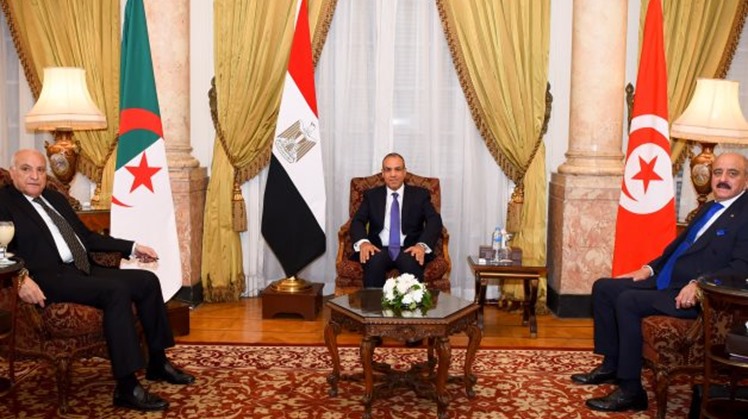CAIRO – 1 June 2025: Foreign Ministers of Egypt, Algeria and Tunisia urged all Libyan parties to exercise maximum restraint, immediately de-escalate tensions, and prioritize the safety and well-being of the brotherly Libyan people.
In a joint communique between the three Foreign Ministers after holding their Tripartite Neighboring Countries Mechanism on May 31, 2025, they reaffirmed the importance of safeguarding the interests of the Libyan people, preserving the nation’s resources and wealth, and fostering consensus among all Libyan factions.
They emphasized that this process must occur under the auspices of the United Nations, with the support of Libya’s neighboring states, to bring an end to division and move forward toward unifying state institutions and holding simultaneous presidential and parliamentary elections.
The Ministers stressed the urgency of resolving the Libyan crisis and ending political fragmentation to prevent further escalation, the spread of violence and terrorism, and the widening of internal conflict. They underscored that Libya’s security is an integral part of the security of neighboring countries.
The Ministers affirmed the necessity of ensuring that the political process is fully Libyan-owned, emphasizing that any sustainable solution must emerge from inclusive national dialogue reflecting the will and consensus of all Libyan components. They emphasized the importance of pursuing this process without exclusion and with international support, particularly from the United Nations.
The Ministers firmly rejected all forms of foreign interference in Libya, noting that such actions only serve to deepen internal divisions and prolong the crisis, thereby undermining security and stability in Libya and the broader region.
They reaffirmed their support for the efforts of the 5+5 Joint Military Commission to consolidate the existing ceasefire, facilitate the withdrawal of all foreign forces, fighters, and mercenaries within a defined timeframe, and unify Libya’s military and security institutions. These goals, they stressed, must align with ongoing efforts under UN, African Union, Arab League, and Mediterranean frameworks.
The Ministers agreed to maintain regular coordination among the three countries, in collaboration with the United Nations, to monitor developments in Libya, exchange views on the evolving political landscape, and identify avenues for regional cooperation to promote security, stability, and development.
The Tripartite Neighboring Countries Mechanism aimed at discussing the latest developments in Libya and advancing the political process toward a comprehensive resolution of the crisis.
The tripartite mechanism between Egypt, Algeria, and Tunisia was launched in 2017 and ceased in 2019. Today's meeting in Cairo aimed at reactivating this joint mechanism, based on the three countries' commitment to supporting security and stability in sisterly Libya.
Since the overthrow of former Libyan leader Muammar Gaddafi in 2011, Libya has been plagued by conflict and political division. The country is currently split between two rival governments: the U.N.-recognized Government of National Unity in Tripoli, led by Abdulhamid Dbeibah and supported by allied armed factions; and a rival administration, based in Benghazi and backed by forces loyal to retired General Khalifa Haftar.
Heavy and intense clashes have erupted since May 13, 2025 following the killing of Field Commander Abdul Ghani al-Kikli—also known as "Ghaniwa"—a prominent figure who led the Stability Support Apparatus and served as head of the Presidential Council's security unit.
On May 30, Libyan protesters set fire to car tires and closed the main roads in Tripoli, calling for ousting the government led by Dbeibah, BBC reported.
 Sun, Jun. 1, 2025
Sun, Jun. 1, 2025